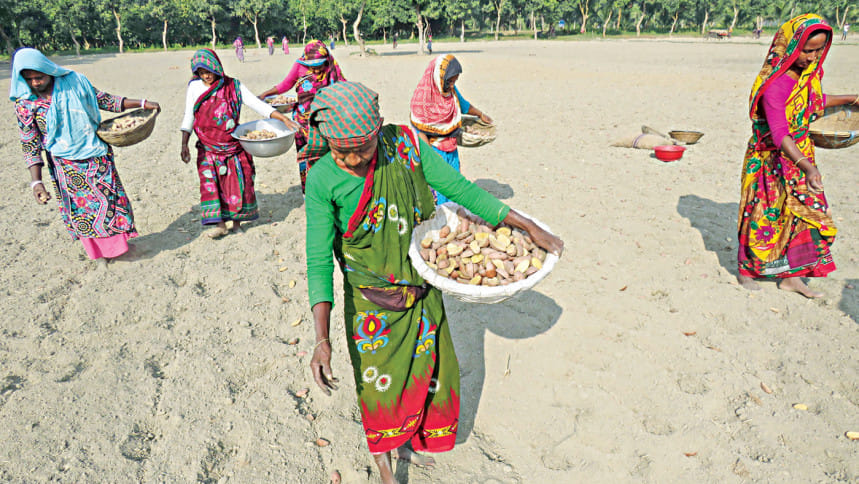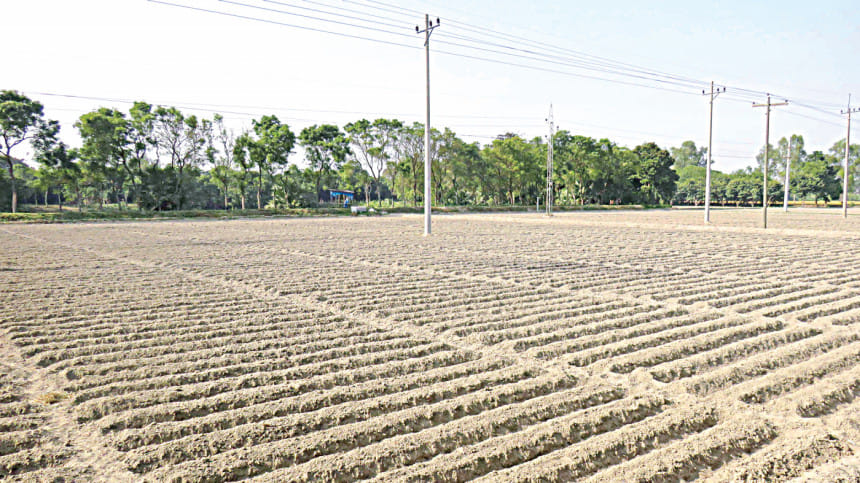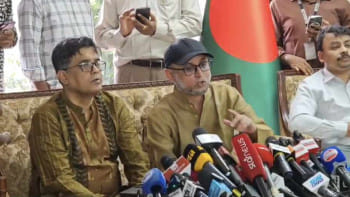Potato cultivation expands as prices rise

Potato cultivation has increased across Bangladesh as farmers have been getting higher prices year-round amid elevated inflation in the country.
About 4.65 lakh hectares of land were brought under potato cultivation this season compared to 4.50 lakh hectares last year, according to data of the Department of Agricultural Extension (DAE).
Shariful Islam, a potato farmer of Sherpur upazila in Bogura, said he made a profit of around Tk 2 lakh by selling the potatoes he grew on 10 bighas of leased land last season.
As such, he has leased 20 bighas for growing potato this season in hopes of securing similar returns.
Farid Uddin, deputy assistant agricultural officer of the Bogura DAE, said potato cultivation in the district has expanded to 55,500 hectares this season while the total acreage was 55,260 hectares last season.

The planting season for potatoes runs from October to November while harvesting activities are carried out in February and April.
Low and middle-income people have been bearing the brunt of the persisting inflationary pressure, which has hovered above 9 percent since March 2023.
The inflation rate swelled to a three-month high of 10.87 percent in October this year driven by soaring food prices, particularly for rice and vegetables, shows data of the Bangladesh Bureau of Statistics.
Showkat Osman, director of the DAE's crops wing, said potato cultivation has naturally increased this year as farmers are getting higher prices for the crop.
Potatoes were selling for as much as Tk 80 per kilogramme (kg) in Dhaka yesterday while the price was Tk 75 just a week ago. On a monthly basis, the price of potato rose by about 33 percent since October.
Similarly, prices of the tuber grew by 78 percent year-on-year, as per data of the state-run Trading Corporation of Bangladesh.
WHY ARE POTATOES SO EXPENSIVE?
Cold storage owners said that although stocks of potato from last season are nearly at an end, there should be no shortage of supply as fresh harvests of the crop have already arrived at markets.
Besides, the National Board of Revenue reduced the import duty on potato to 15 percent from 25 percent and also lifted the 3 percent regulatory duty on September 5 to encourage imports of the tuber.
However, potato imports have not reached the desired level despite the duty reduction, so it had little effect on the domestic prices, they added.
Furthermore, they informed that the prices are still increasing due to the lack of market supervision.
Traders said the production of many vegetables was disrupted by heavy rains and floods early this year.
As such, the subsequent delay in farmers delivering fresh harvests to the market has forced traders to increase the price of potatoes kept in cold storage, they added.
The traders also said that while it is normal for potato prices to be slightly higher at the start of each season, they are much higher than usual at present even though new stocks are expected to arrive by December.
Meanwhile, there have been allegations that potatoes are being hoarded at cold storages to artificially raise their prices and thereby secure more profit.
Mohammad Robiul Faisal, deputy commissioner of Rangpur, acknowledged that the hoarding has inflated prices, and his office has been working to control the market.
Shahidul Islam Shahid, vice-president of the Hili Importers and Exporters Group, said the price of imported potato jumped after India created complications for exporting the crop to Bangladesh.
He informed that imports of potato through Hili land port have remained suspended since Monday.
Bangladesh produced 1.9 crore tonnes of potato last season and is estimated to produce 1.13 crore tonnes this season, the DAE data shows.
According to the Bangladesh Cold Storage Association, potatoes were stored in about 360 cold storages last season and most of the stocks have been sold.
As per the latest estimates, approximately 300,000 tonnes of potato are remaining in 122 cold storages.
Mostofa Azad Chowdhury Babu, president of the Bangladesh Cold Storage Association, said stockists have increased the potato prices due to the gap between demand and supply.
Last season, there was a shortage of 15 to 20 lakh tonnes of potato, he added.
According to the DAE, the annual demand for potatoes stands at around 90 lakh tonnes. Against this backdrop, Babu said the production should be facilitated in various ways.
"For example, the government could buy potatoes the same way it buys rice this season. Otherwise, it will not be possible to control prices," Chowdhury said.


 For all latest news, follow The Daily Star's Google News channel.
For all latest news, follow The Daily Star's Google News channel. 



Comments